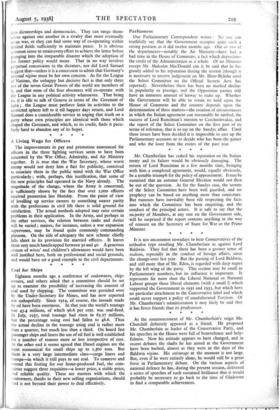Coal for Ships Eighteen months ago a conference of coalowners,
ship- owners, and others asked that a committee should be set up to examine the possibility of increasing the amount of coal used by shipping. The committee was presided over by the Under-Secretary for Mines, and has now reported not unhopefully. Since 1914, of course, the inroads made by oil have been enormous. In that year the world's tonnage was 45.4 millions, of which 96.6 per cent. was coal-fired. In July, 1937, total tonnage had risen to 65.27 millions, but the percentage using coal had fallen to 48.6. Thus the actual decline in the tonnage using coal is rather more than a quarter, but much less than a third. On board fast passenger ships and liners the use of oil fuel is well established for a number of reasons more or less irrespective of cost. At the other end it seems agreed that Diesel engines are the most economical for small ships up to 1,5oo tons. But there is a very large intermediate class—cargo liners and tramps—in which it still pays to use coal. To conserve and extend this footing for our home-produced fuel, the com- taittee suggest three requisites—a lower price, a stable price, Ind reliable quality. These are matters with which the coalowners, thanks to their new selling organisations, should '.nd it not beyond their power to deal effectively.


































 Previous page
Previous page